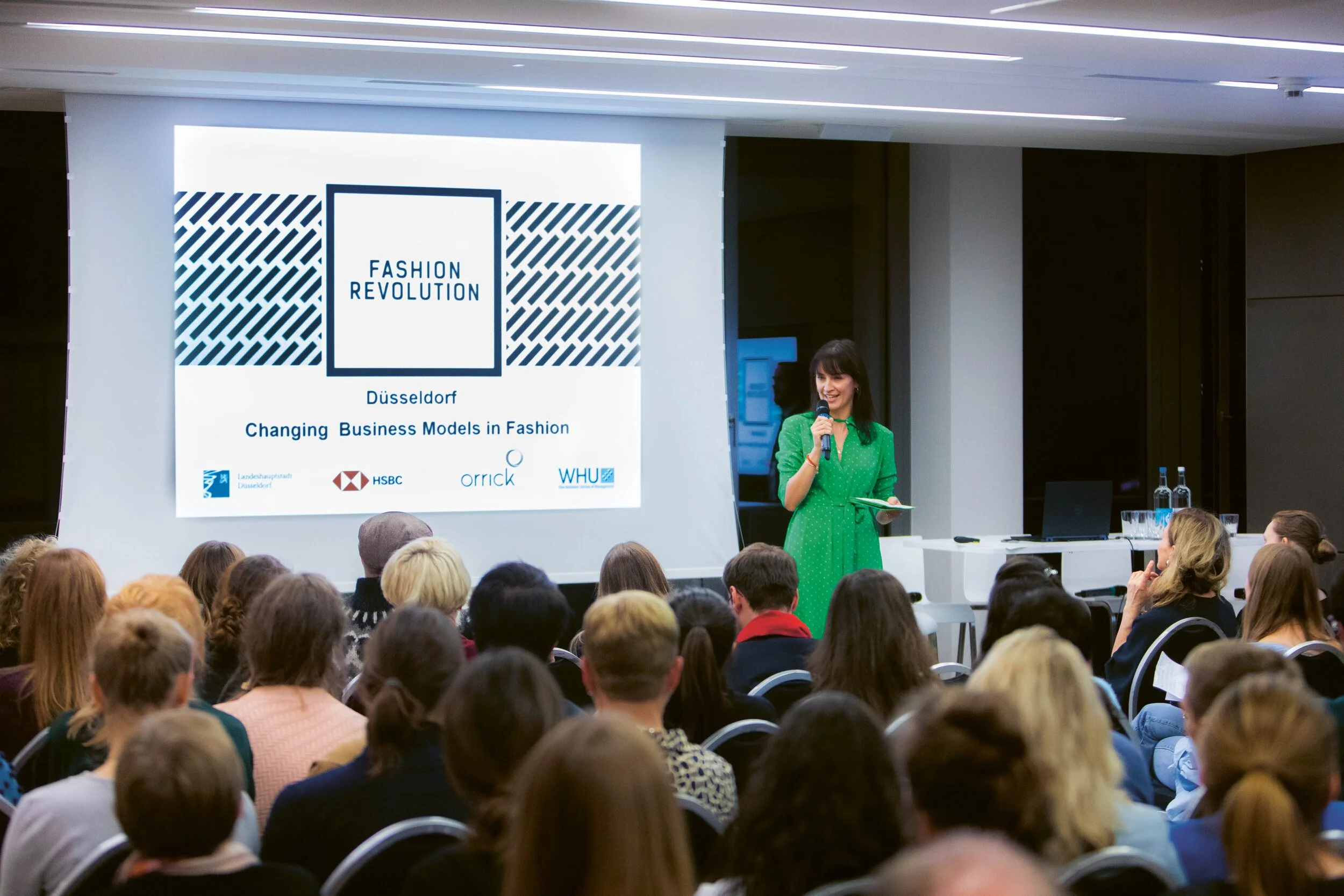THE FUTURE OF FASHION
Social activist, entrepreneur, research scientist – Dr Monika Hauck, the founder of Open Innovation based in Düsseldorf, is aiming to lead the fashion industry towards a more sustainable future. She spoke with VIVID about the responsibility of an entire industry.
Monika Hauck
Entrepreneur and Innovation
Researcher at the WHU Otto Beisheim
School of Management
Ambassador of Fashion Revolution
Founder of Change-Room
Dr Monika Hauck is the founder, cosmopolitan and advocate for sustainable and integrative entrepreneurship in the fashion industry. Based at the Entrepreneurship Centre, which is part of the WHU Otto Beisheim School of Management, she supports innovative initiatives taken by businesses. Hauck was born and raised in Lithuania and initially experienced the fashion industry from a different point of view; at the age of 15 she became a model, travelled the world and moved to Düsseldorf because of love. At the end of 2019 she founded Change-Room.org, an information and community-platform aiming for a more transparent, sustainable and integrative fashion industry.
How did that change from being a model to becoming an advocate for sustainable fashion come about?
When I finished working as a model I studied business management, worked in the financial sector and researched the open innovation processes within fashion as part of my doctoral degree. I became aware that the fashion industry is neither open minded, cooperative nor innovative. It is only at the end of the supply chain, for example at the point of e-commerce, personalisation, data analytics or 3D, that innovation takes place at all. There is hardly any innovation towards the beginning of the supply chain. The processes and structures that determine the production of fashion are the same as they were 100 years ago – greatly dependent on manual labour. There was – and there is still – child labour, it’s just that it has been relocated from the US or Europe to the developing countries. Injustices like that motivated me to look into the subject more deeply.
“THE CHANGES IN THE LAST THREE MONTHS WOULD HAVE TAKEN THREE YEARS WITHOUT CORONA.”
You are also a dedicated campaigner pushing towards a radical change within the fashion industry. Was this motivated by a particular experience?
My generation in particular has been responsible for the growth of fast fashion. For a period of time people felt proud to be able to express themselves by wearing cheap clothes. However, this sentiment is currently changing. Once you understand the true costs of seemingly cheap fashion, you start questioning your behaviour as a consumer. During my innovation research I came about the social movement Fashion Revolution. When I discovered that it was not active in Düsseldorf, a major location in the fashion industry, I introduced it to our city. Fashion Revolution sets up events with a deeper meaning, which we use to make it easier to access information about sustainable fashion for anyone who is interested, be it a business insider or a consumer, a young designer or a city banker.
You founded the information and community-platform Change Room – what is its mission?
The sustainable fashion community in Düsseldorf is still quite small. With Change Room we aim to increase awareness, create a community network and bring together the stakeholders – for example the big corporates, established organisations, founders, consumers and also the government – and convince them that we have to rethink fashion in Düsseldorf, too. We support entrepreneurs and work on our own pilot projects trying out radical new ideas within the fashion industry.
Do you think the coronavirus pandemic has had an impact upon sustainable thinking within the fashion industry, perhaps speeded it up?
Yes, definitely. So far we have had little ripples of a change of consciousness until the coronavirus created a big wave of awareness of sustainability. The changes that have happened during the past three months would have taken three years without the pandemic. The crisis has brought a lot to the surface, for example the topic of responsibility. A part of the circular economy is the ’Extended Producer Responsibility’: corporations are not only responsible up to the point of sale, but beyond. We are slowly bidding farewell to the linear system of fashion, which is to produce as quickly and cheaply as possible and to sell as much as possible. The future is about new modes of production of items that can be easily mended, that people can wear for years and dispose of in an environmental friendly way.
How can each person help to lessen the negative impact the fashion industry is having?
The amount of fashion produced has more than doubled in the last 15 years. There are tons of unworn clothes inside our wardrobes and the manufacturers’ warehouses. We have to take back control of our wardrobes, instead of letting the fashion industry control us. I am not against the fashion industry in principle, quite the opposite, I grew up with it. However, the power of this industry, their great influence, inspiration and creativity should be used in a more positive way and finally respect the people who actually make the clothes. This means that people should buy less and should be prepared to spend more on a garment and, in the end, appreciate it more. •
FACTS AND FIGURES FASHION REVOLUTION
In 2013 the global movement Fashion Revolution was founded to commemorate the 1,127 lives lost in the collapse of the textile manufacturing plant in Bangladesh and to advocate for fairer working conditions in the manufacturing part of the fashion industry. Each year around 24th of April the ’Fashion Revolution Week’ organises panel discussions, film viewings and clothes-swap-parties as a reminder of the disaster of Dhaka.
Words: Karolina Landowski
Pictures: PR, Falco Peters


